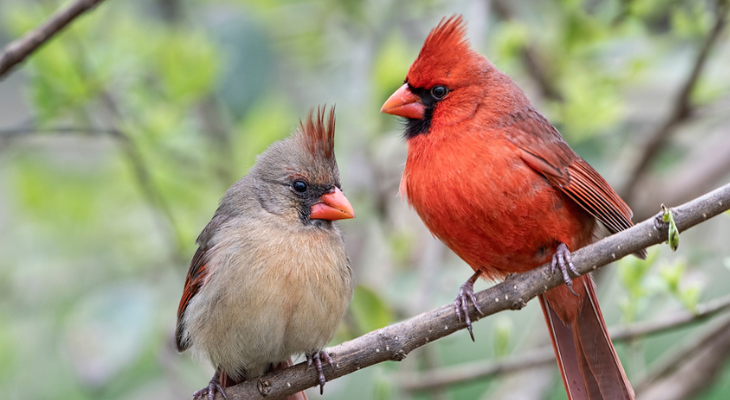
Don't Forget to Celebrate National Bird Day on January 5
Since birds far outnumber humans, it only makes sense to declare an annual day in their honor. National Bird Day is dedicated to improving conditions for wild birds, while also focusing on the needs of pet birds. If you're wondering what you can do to celebrate these feathered creatures, we have a few suggestions for you.
Take Up Birdwatching
No matter where you live in the U.S., you'll find plenty of birds to observe. In fact, 200 to 400 billion birds make their home on earth, according to the American Museum of Natural History, while the human population numbers only 5 billion. Identifying birds in their natural habitats and observing their behaviors offers hours of fun for the entire family.
Not sure which bird is which? Buy a bird identification book or check out the National Audubon Society's online guide to North American birds. The guide offers photographs and information about nesting, habitats, diet, feeding behavior, and egg identification.
Support Conservation Efforts
Bird populations are declining throughout the world, due to the effects of pollution, destruction of habitats, and climate change. By the year 2100, the American Museum of Natural History estimates that 14% of bird species will be extinct. Declining bird populations have an effect on all of us. Birds help us by:
- Eating Pests and Weeds
- Spreading Seeds That Support the Growth of Plant Life
- Pollinating Plants (Some Species)
- Fertilizing Soil and Marine Ecosystems with Their Droppings
- Preventing the Spread of Disease by Eating Animal Carcasses (Vultures)
Birds also offer important clues about the state of the environment. If the bird population suddenly decreases in a certain area, toxins that could also threaten human life may be present. Monitoring bird populations is a simple way to identify potential problems before they cause widespread environmental issues.
Wondering how you can help birds? Try a few of these tips:
- Use Fewer Plastic Products. Birds aren't picky when choosing their next meal. A piece of plastic looks just as tasty as berries or insects. Unfortunately, plastic fills up a bird's stomach, limiting the amount of healthy food it can eat. If a bird eats too much plastic, it may eventually starve to death. Eating plastic may also affect a bird's physical development. Seabirds that eat plastic have smaller bodies and shorter wings and bills, according to Ocean Blue Project.
- Add Bird-Friendly Plants to Your Landscape. Create a backyard haven for native birds by including plants they eat or use to build nests in your yard or garden. You can find the types of plants that draw the birds in your area in a bird identification guide.
- Make a Change to Your Coffee Habit. Follow the Cornell Lab of Ornithology's recommendation and buy coffee that's certified bird-friendly. Bird-friendly coffee is grown on coffee plantations that offer a winter habitat for migrating birds. The Smithsonian's National Zoo & Conservation Biology Institute offers list of retailers that sell the coffee.
- Keep Your Cats Inside. Cats kill birds and contribute to the declining bird population.
Visit a Zoo or Aviary
Zoos and aviaries offer the chance to view birds that you wouldn't normally see in your area. Employees at these educational institutions can offer a wealth of information about the birds' habits, special characteristics, natural habitats and typical diet. In between visits, learn more about your favorite species by watching online videos or checking out books from the library.
Protect Your Pet Bird's Health
Do you know the signs that may mean that your bird is ill? Signs of illness in birds can include:
- Reduced Activity Level
- Disinterest in Food and Water
- Weight Loss
- Vomiting
- Behavior Changes
- Ruffled Feathers
- Sleeping More Than Usual
- Sneezing
- Nasal or Eye Discharge
- Red Eyes
- Singing Less
- Wheezing or Clicking When Breathing
- Balance Problems
If you notice any of these or other health problems, it's time to take your pet to the veterinarian. In addition to treating the illness, the veterinarian can recommend changes that may help your pet from becoming ill again.
Regular visits to the veterinarian help protect your pet's health, whether you have a bird, dog, cat, or small animal. Give us a call to schedule your pet's appointment.
Sources:
American Museum of Natural History: About How Big Is the Bird Population? Has It Gone Down Because of Global Warming or Pollution?
National Audubon Society: Guide to North American Birds
https://www.audubon.org/bird-guide
Ocean Blue Project: The Effects of Plastic Pollution on Seabirds
https://oceanblueproject.org/the-effects-of-plastic-p-on-seabirds
The Cornell Lab of Ornithology: 10 Ways to Help Birds
https://www.birds.cornell.edu/home/get-involved/10-ways-to-help-birds/
Smithsonian's National Zoo & Conservation Biology Institute: Where to Buy Bird-Friendly Coffee
https://nationalzoo.si.edu/migratory-birds/where-buy-bird-friendly-coffee
Merck Manual: Signs of Illness in Pet Birds, 10/2022
